In the world of online education, Datacamp and Coursera stand as two prominent choices for those seeking to expand their knowledge and skills.
Whether you’re venturing into data science, programming, or exploring a broader range of subjects, these platforms offer diverse opportunities for learning and growth.
But, which platform is better, Datacamp or Coursera?
In this comprehensive comparison, we’ll delve into the features, certificates, mobile accessibility, and more to help you make an informed decision between Datacamp and Coursera.
My Datacamp vs Coursera review is full and in-depth, but if you’re in a rush the headlines are:
Datacamp
Datacamp is a leading online learning platform known for its specialization in data science, analytics, and programming. Its standout features include interactive, hands-on learning through coding exercises, skill tracks that provide structured learning paths, and content created by industry experts for real-world relevance. With a focus on practical skills and a user-friendly interface, Datacamp equips learners with the knowledge and proficiency needed to excel in data-related fields.
Coursera
Coursera is a versatile online learning platform known for its extensive course catalog, offering structured learning with video lectures, assignments, and peer interactions. It provides opportunities for academic and professional growth through specialization programs, degrees in partnership with renowned universities, and verified certificates. Coursera’s diverse offerings cater to a wide range of learning goals.
Datacamp and Coursera in a Nutshell
About Datacamp
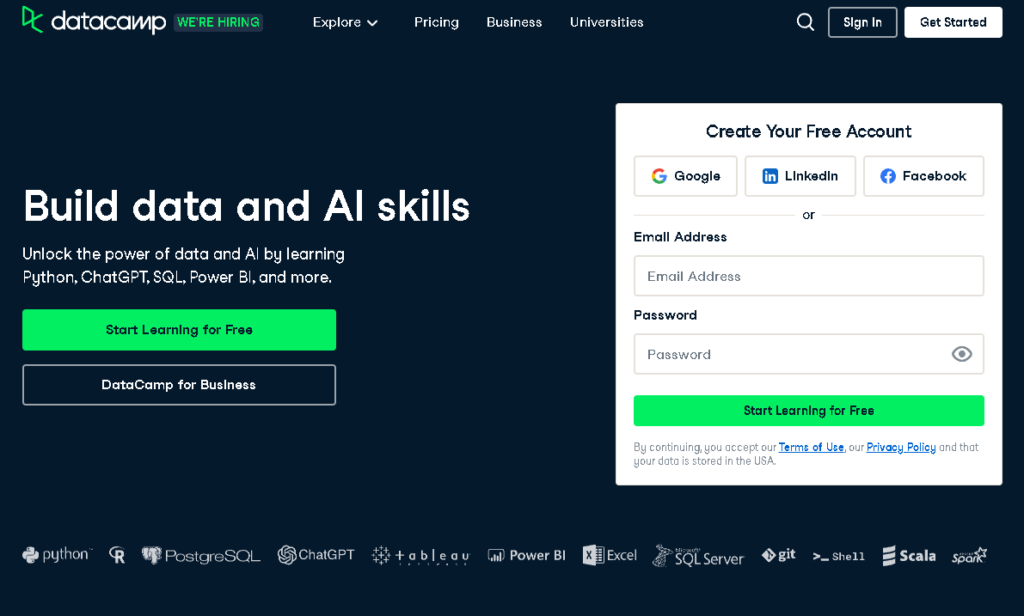
Datacamp, established in 2013, is a prominent online learning platform tailored for individuals looking to dive into the realms of data science, analytics, and programming.
With a mission to equip learners with the essential skills required in today’s data-centric landscape, Datacamp has emerged as a trusted resource. It stands out by offering an interactive and hands-on learning experience, where learners can engage in coding exercises that reinforce their understanding.
Datacamp’s comprehensive library of courses, projects, and skill tracks caters to a wide range of skill levels and objectives, making it a go-to choice for anyone seeking to thrive in the world of data-driven insights and analysis.
About Coursera

Coursera, founded in 2012 by Stanford University professors, is a renowned online learning platform that offers a vast array of courses and specializations across a wide spectrum of subjects.
Unlike specialized platforms like Datacamp, Coursera provides a comprehensive educational experience that encompasses everything from arts and humanities to technology and business.
Coursera partners with top universities and institutions worldwide to deliver high-quality content, making it a go-to destination for individuals seeking academic and professional development.
With a flexible learning model, learners can choose from individual courses or enroll in full degree programs, providing unparalleled flexibility and variety in their educational pursuits.
Coursera’s global reach and extensive course catalog have made it a household name in the online education arena, catering to diverse learning needs and ambitions.
Datacamp vs Coursera Courses
When comparing Datacamp and Coursera, one of the key aspects to consider is the range and quality of courses each platform offers.
My Top Tips for Finding the Best Courses
- Define Your Learning Goals: Start by clearly defining your learning objectives and what you aim to achieve from the course. Knowing your goals will help you narrow down your options and choose courses that align with your needs.
- Check Accreditation and Recognition: Ensure that the course and the institution or platform offering it are accredited and recognized in your field of interest. Accredited courses often hold more value and credibility.
- Read Reviews and Testimonials: Look for reviews and testimonials from previous learners who have taken the course. Their experiences can provide valuable insights into the course content, quality, and effectiveness.
- Consider Instructor Credentials: Investigate the qualifications and experience of the course instructors. Instructors with expertise and real-world experience in the subject matter are more likely to deliver high-quality content.
- Course Structure and Materials: Examine the course structure, including the syllabus, assignments, and materials provided. Make sure the course offers a comprehensive and well-organized curriculum.
- Interactive Learning Opportunities: Check if the course offers interactive elements such as quizzes, assignments, discussions, and peer feedback. These features enhance your learning experience and help reinforce your understanding.
- Cost and Financial Aid: Evaluate the course cost and whether there are any financial aid options, scholarships, or discounts available. Ensure that the course’s value aligns with its price.
About Datacamp Courses
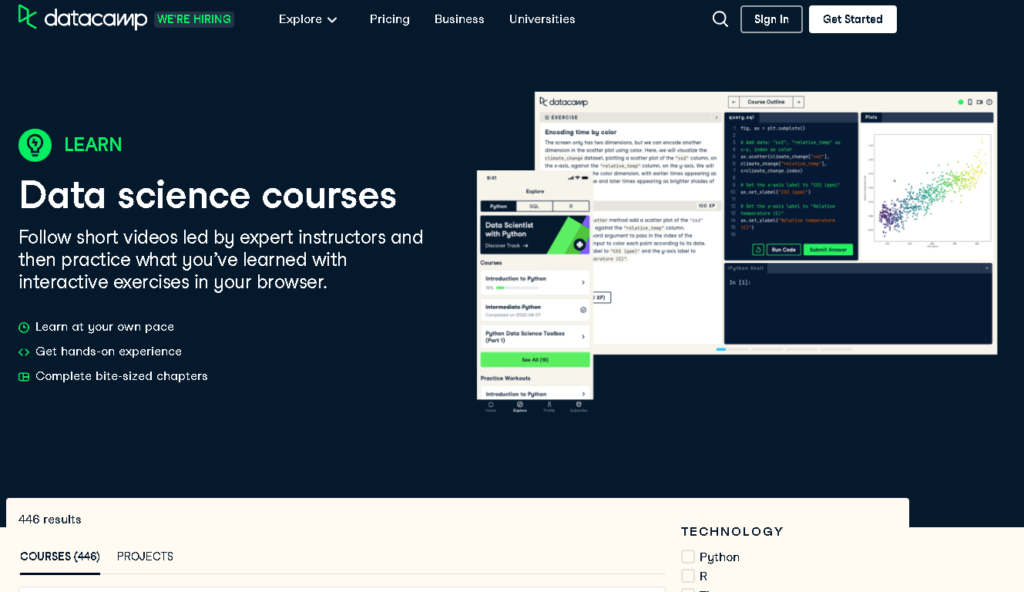
Datacamp is a specialist in the field of data science, analytics, and programming. Its courses are designed to provide learners with practical, hands-on experience in these areas.
Datacamp’s course library primarily focuses on data-related topics, including Python and R programming, machine learning, data visualization, and more.
What sets Datacamp apart is its interactive learning approach, with courses structured around coding exercises that allow you to apply what you’ve learned in a real-world context.
These exercises help reinforce your understanding and build practical skills. Datacamp also offers skill tracks, which are curated collections of courses that allow you to master a specific skill or topic progressively.
Best Datacamp Courses
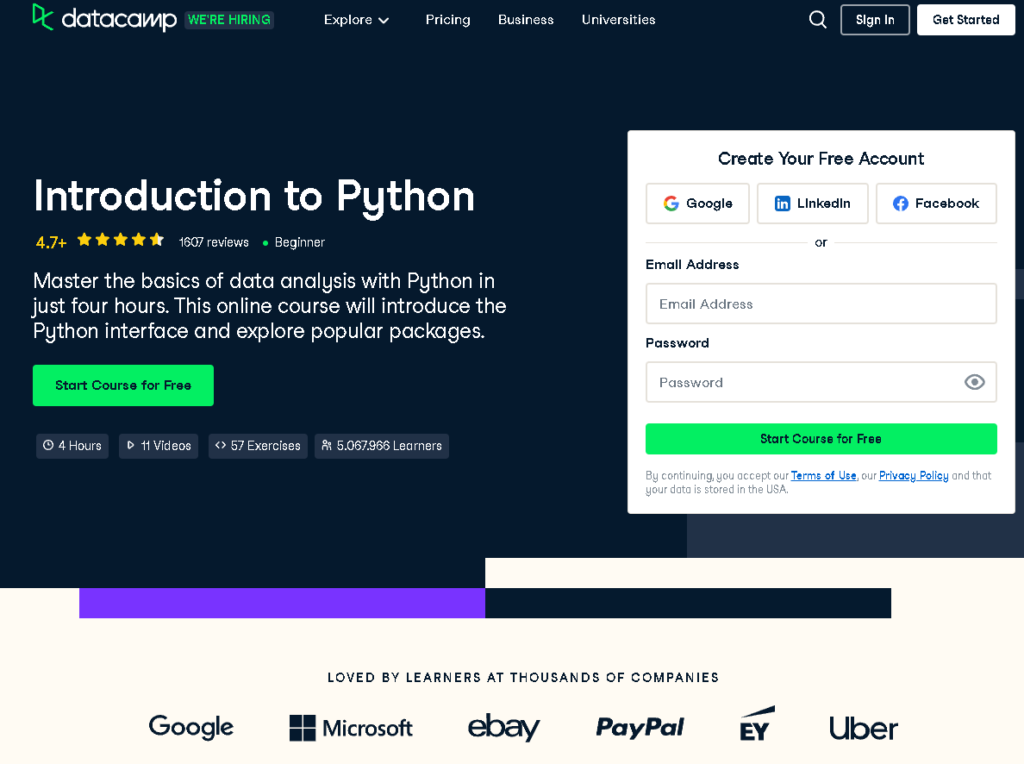
- Introduction to Python: This fundamental course introduces you to Python, one of the most widely used programming languages in data science. You’ll learn the basics of Python syntax, data types, and how to perform essential tasks, making it an excellent starting point for beginners.
- Intermediate Python: Building on the basics, this course dives deeper into Python programming. It covers more advanced topics like object-oriented programming, data manipulation with Pandas, and data visualization with Matplotlib, enhancing your Python skills for data analysis.
- Understanding Machine Learning: Designed for learners with no prior machine learning experience, this course demystifies machine learning concepts. It explains various algorithms, their applications, and how to implement them in Python, making it accessible to beginners.
- Data Visualization with Python: Data visualization is a crucial skill for data analysts and scientists. This course teaches you how to create informative and compelling data visualizations using Python libraries like Matplotlib, Seaborn, and Plotly.
- Introduction to SQL: SQL is the language of databases, and this course provides a solid foundation in SQL. You’ll learn how to retrieve, manipulate, and analyze data from relational databases, a fundamental skill for anyone working with data.
- Time Series Analysis with Python: Time series data is prevalent in fields like finance, economics, and environmental science. This course equips you with the knowledge and tools to analyze and forecast time series data using Python.
- Introduction to R: R is another essential programming language in data science. This course introduces you to R and its capabilities for data analysis and visualization, making it a valuable addition to your skill set, especially if you work with data in both Python and R.
About Coursera Courses
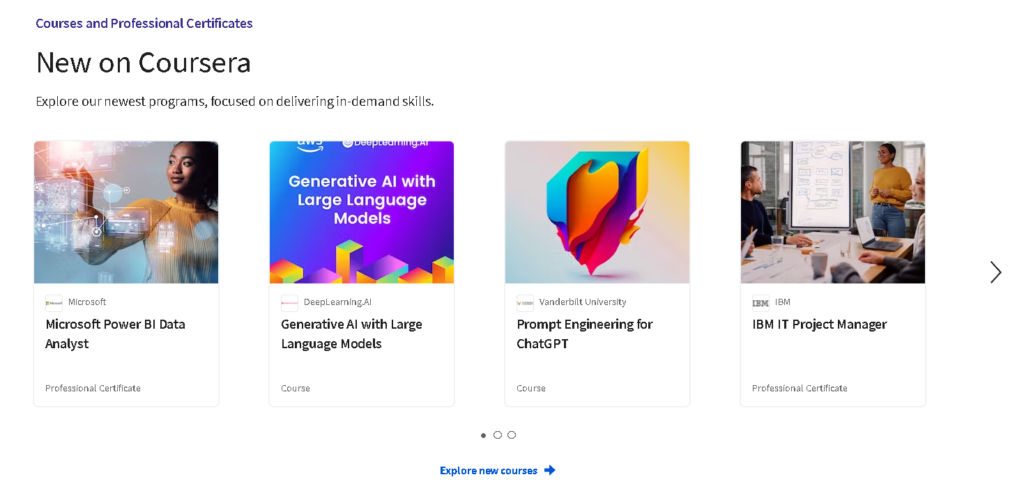
Coursera, on the other hand, offers a much broader spectrum of courses. It collaborates with universities and institutions from around the world, providing a wide variety of subjects.
While Coursera does offer courses in data science and programming, it goes well beyond that, including offerings in arts, humanities, business, and many more.
Coursera’s courses are typically more in-depth and structured, often resembling traditional university courses with video lectures, assignments, quizzes, and peer interactions.
Additionally, Coursera offers specialization programs, professional certificates, and even full online degrees in partnership with universities.
Best Coursera Courses
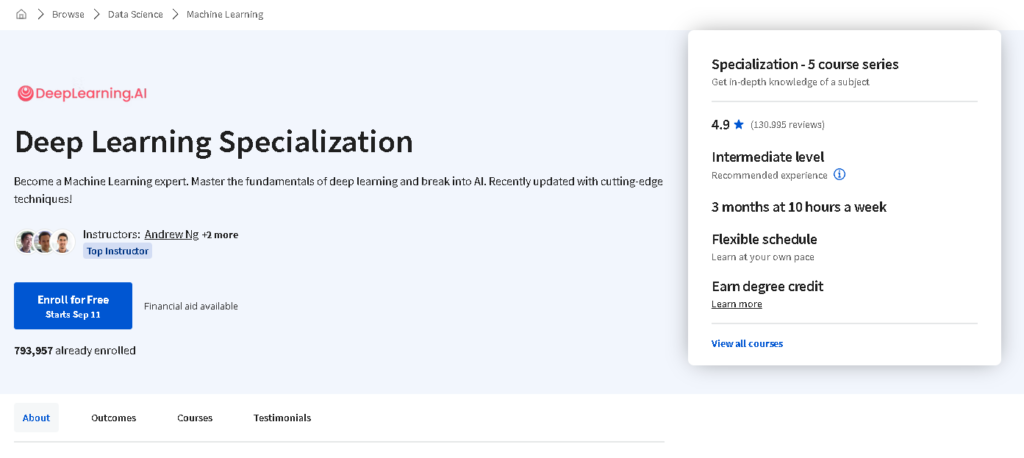
- Machine Learning by Stanford University: This course, taught by Andrew Ng, is one of Coursera’s most renowned offerings. It provides a comprehensive introduction to machine learning, covering key algorithms and techniques. Andrew Ng’s teaching is highly regarded in the field, making this course a standout choice.
- Data Science Specialization by Johns Hopkins University: This specialization includes a series of courses covering various aspects of data science, including data analysis, data visualization, and machine learning. It’s ideal for those looking to build a strong foundation in data science.
- Google IT Support Professional Certificate: Developed by Google, this program is designed to prepare learners for entry-level IT support jobs. It covers essential IT skills, troubleshooting, and customer service, making it a practical choice for those entering the IT field.
- Deep Learning Specialization by deeplearning.ai: Led by Andrew Ng, this specialization focuses on deep learning, a subfield of machine learning. It delves into neural networks, sequence models, and other advanced topics, making it suitable for learners interested in cutting-edge AI.
- Introduction to Programming with Python by the University of Michigan: If you’re new to programming, this beginner-friendly course is an excellent choice. It covers Python programming from the ground up, teaching you the fundamentals of coding.
- Financial Markets by Yale University: This course offers a comprehensive overview of financial markets, including stocks, bonds, and derivatives. It’s taught by Robert Shiller, a Nobel laureate in economics, making it a valuable resource for those interested in finance.
- Data Science and Machine Learning Bootcamp with R and Python: This bootcamp-style course covers a wide range of data science and machine learning topics using both R and Python. It’s a practical choice for learners who want to gain hands-on experience in data analysis and modeling.
Datacamp vs Coursera Teachers and Course Quality
When choosing an online learning platform like Datacamp or Coursera, it’s essential to consider the expertise of the instructors and the overall quality of the courses.
Datacamp Teachers and Quality
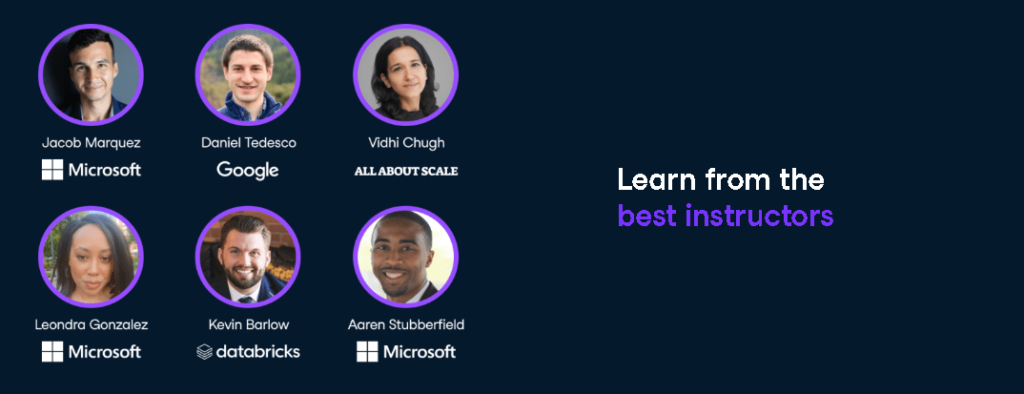
Datacamp prides itself on offering courses created and taught by experts in the field of data science and programming.
The platform collaborates with industry professionals and educators who bring practical, real-world knowledge to the courses. This approach ensures that learners receive up-to-date information and relevant skills.
The hallmark of Datacamp’s course quality is its hands-on approach, with interactive coding exercises that allow you to apply what you’ve learned in a practical context.
The bite-sized lessons and immediate feedback contribute to a dynamic and engaging learning experience.
Coursera Teachers and Quality

Coursera’s courses are often developed and taught by faculty members from prestigious universities and experts from various industries.
The instructors bring academic rigor and in-depth knowledge to their courses. Coursera courses are typically more structured and resemble traditional university courses, complete with video lectures, assignments, quizzes, and peer interactions.
This format offers a comprehensive and academically rigorous learning experience. Additionally, Coursera’s partnerships with top institutions worldwide ensure that the content meets high educational standards.
Teachers and Quality In short
- Datacamp excels in providing practical, industry-relevant knowledge, ideal for those who prefer a hands-on, skill-oriented approach.
- Coursera offers a more structured, academically rigorous experience, making it suitable for individuals seeking in-depth understanding and potentially academic certifications.
Datacamp vs Coursera Features
When deciding between Datacamp and Coursera as your online learning platform, it’s crucial to examine the features they offer to ensure they align with your learning preferences and goals.
Datacamp Features
- 440+ Courses
- Datacamp’s courses are designed for hands-on learning, with interactive coding exercises that reinforce your understanding.
- Datacamp offers curated collections of courses called skill tracks, allowing you to master a specific skill or topic progressively.
- Datacamp specializes in data science, analytics, and programming, making it a go-to platform for related disciplines.
- Courses are created by industry experts, ensuring that the content is up-to-date and relevant to the job market.
- Datacamp provides mobile apps, allowing you to learn on the go.
Coursera Features
- Coursera offers 7000+ courses across various subjects, including arts, humanities, business, and technology.
- Courses are often developed in collaboration with top universities and institutions worldwide.
- Coursera courses follow a structured format with video lectures, assignments, quizzes, and peer interactions, resembling traditional university courses.
- Coursera offers specialization programs that allow you to delve deeper into specific topics.
- Coursera provides full online degrees in partnership with universities.
- Financial aid options, scholarships, and discounts are available for eligible learners.
- 1700+ Free Courses
Datacamp vs Coursera Pricing and Refund Policy
Datacamp Pricing
Datacamp offers a monthly subscription for $25 or an annual subscription for $300, providing flexibility for learners to choose the plan that best suits their budget and learning pace.
The annual subscription offers significant cost savings and continuous access to Datacamp’s extensive course catalog. Keep an eye out for occasional promotions and discounts to maximize the value of your learning investment.
Datacamp Refund Policy
Datacamp provides a generous 30-day refund policy, ensuring that learners have ample time to explore the platform and its courses risk-free. If, within the first month of subscription, you find Datacamp doesn’t meet your expectations, you can request a refund with no questions asked.
This straightforward refund policy underscores Datacamp’s commitment to customer satisfaction and provides peace of mind to those considering their subscription.
Coursera Pricing
Coursera’s pricing model is diverse, offering various options for learners. While many courses can be audited for free, individuals seeking graded assignments and certificates have the option to purchase courses individually.
Additionally, Coursera offers a subscription called Coursera Plus, which costs $59 per month or $399 annually and grants access to 7000+ courses and specializations on the platform.
The flexibility in pricing caters to both budget-conscious learners who want to take specific courses and those who prefer unlimited access to a wide range of content.
Coursera Refund Policy
Coursera typically offers a 14-day refund policy for individual courses and Coursera Plus subscriptions.
Learners who wish to request a refund must do so within the specified time frame.
While Coursera strives to accommodate refund requests, learners should be mindful of the deadlines and guidelines set forth by the platform and its partners.
Datacamp vs Coursera Pros, Cons, and Best For
When comparing Datacamp and Coursera, it’s important to weigh the pros and cons of each platform to determine which one is the best fit for your learning needs.
Datacamp Pros
- Datacamp excels in data science, analytics, and programming, making it an excellent choice for individuals seeking expertise in these fields.
- Its interactive approach with coding exercises allows learners to gain practical, real-world skills.
- Courses are created by industry experts, ensuring up-to-date and job-relevant knowledge.
- Datacamp offers mobile apps, allowing you to learn on the go.
Datacamp Cons
- Datacamp’s specialization may not suit learners interested in a broader range of subjects.
- Some may find its self-paced, less-structured approach challenging.
Datacamp Best For
- Aspiring Data Scientists: Datacamp is an ideal choice for those looking to specialize in data science, analytics, and programming, as it offers a deep dive into these fields.
- Practical Learners: It’s best suited for individuals who prefer a hands-on, interactive learning approach with coding exercises.
- Industry-Relevant Skills: Datacamp courses are created by industry experts, ensuring that learners gain up-to-date and job-relevant knowledge.
- Those Seeking Real-World Application: It’s great for learners who want to apply their skills immediately in practical scenarios.
Coursera Pros
- Coursera offers a wide variety of courses across multiple disciplines, making it suitable for learners with diverse interests.
- Courses often come from renowned universities and institutions, adding to their credibility.
- Coursera’s format with video lectures, assignments, and peer interactions mirrors traditional university courses.
- You can pursue specialization programs and even full online degrees.
- 1700+ Free Courses Available
Coursera Cons
- While many courses can be audited for free, graded assignments and certificates often come at a cost.
- Coursera’s broad spectrum may not cater to those looking for highly specialized knowledge.
Coursera Best For
- Diverse Interests: Coursera is an excellent choice for learners with diverse interests and career goals, as it offers a wide variety of courses across multiple disciplines.
- Academic Seekers: It’s best suited for individuals seeking academic rigor, credibility, and certification, often provided through partnerships with prestigious universities and institutions.
- Structured Learning: Coursera’s format with video lectures, assignments, quizzes, and peer interactions appeals to those who prefer a structured and organized learning experience.
- Specialization and Degrees: It’s ideal for those looking to pursue specialization programs or even full online degrees in various subjects.
Datacamp vs Coursera Alternatives
While Datacamp and Coursera are popular choices for online learning, several online learning alternatives exist to cater to different learning preferences and goals. Here’s a brief comparison with some noteworthy alternatives:
Udacity

Udacity offers specialized nanodegree programs in tech fields, emphasizing practical skills and real-world projects. It’s a top choice for those seeking career-focused learning.
- Best For: Individuals interested in specialized, career-focused nanodegree programs in tech-related fields like artificial intelligence, data science, and web development.
- Pros: Project-based learning, mentorship, real-world projects, and industry connections.
- Cons: Relatively narrower course selection compared to Coursera, and pricing can be higher for nanodegree programs.
Check out my article comparing Udemy vs Udacity, and Udacity vs Coursera for more information.
Skillshare

Skillshare caters to creative learners with a diverse library of courses in design, photography, and entrepreneurship, offering affordability and project-based learning.
- Best For: Creative individuals looking to explore and develop skills in areas like design, photography, writing, and entrepreneurship.
- Pros: A diverse library of creative courses, project-based learning, and affordability.
- Cons: Less focus on academic or technical subjects compared to Datacamp and Coursera.
Check out my Skillshare vs Udemy article for more information.
Udemy
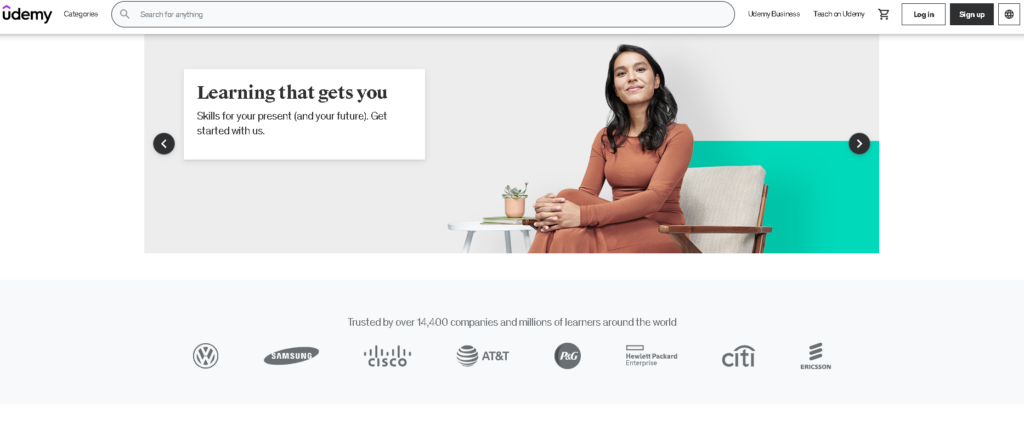
Udemy provides a vast marketplace of courses across various subjects, making it accessible and affordable for learners seeking a broad range of skills, though course quality can vary.
- Best For: Those seeking a vast marketplace of courses across various subjects, from technical to creative.
- Pros: Enormous course selection, affordability, lifetime access to purchased courses, and frequent discounts.
- Cons: Quality and consistency can vary significantly between courses, and not all courses offer certificates.
Datacamp vs Coursera Certificates and Recognitions
When investing in online education through Datacamp vs Coursera, understanding the value of the certificates and recognitions they offer is crucial for your career and personal development.
Datacamp Certificates and Recognitions
- Certificates: Datacamp provides certificates of completion for each course you finish. These certificates showcase your proficiency in specific data science or programming skills and can be shared on your LinkedIn profile or resume.
- Skill Tracks: Datacamp offers skill tracks, which provide a certificate upon completion. These tracks demonstrate your competence in a collection of related skills, enhancing your credibility in your chosen field.
- Industry Relevance: Datacamp’s certificates are recognized in the data science and analytics industry, making them valuable for job applications and career advancement in these fields.
Coursera Certificates and Recognitions
- Certificates: Coursera offers certificates upon course completion, which include a verified signature and can be shared on your LinkedIn profile or included in your resume. These certificates often carry the name and logo of the partnering university or institution, adding to their prestige.
- Specializations: Completing a series of related courses on Coursera results in a specialization certificate. These are particularly beneficial for those looking to gain expertise in a specific area and are recognized by employers.
- Online Degrees: Coursera provides full online degrees in partnership with renowned universities, further boosting your recognition in the job market and academia.
Datacamp vs Coursera Mobile Accessibility
The ability to access online learning platforms via mobile devices is becoming increasingly important for modern learners who value flexibility. Here, we compare the mobile accessibility of Datacamp vs Coursera to help you make an informed choice.
Datacamp Mobile App
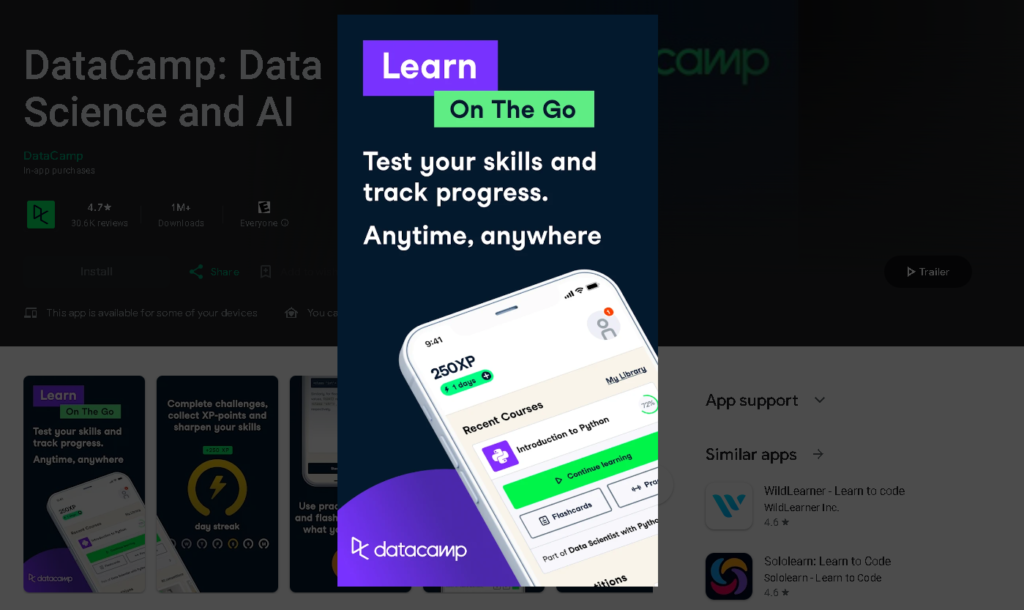
- Mobile Apps: Datacamp offers dedicated mobile apps for both iOS and Android devices. These apps are user-friendly and provide a seamless learning experience on smartphones and tablets.
- Offline Learning: Datacamp’s mobile apps allow you to download course content and exercises for offline learning. This feature is handy for those who want to study without an internet connection during commutes or travel.
- Responsive Design: Datacamp’s website is designed with mobile responsiveness in mind, ensuring that the platform functions well on mobile browsers.
Coursera Mobile App
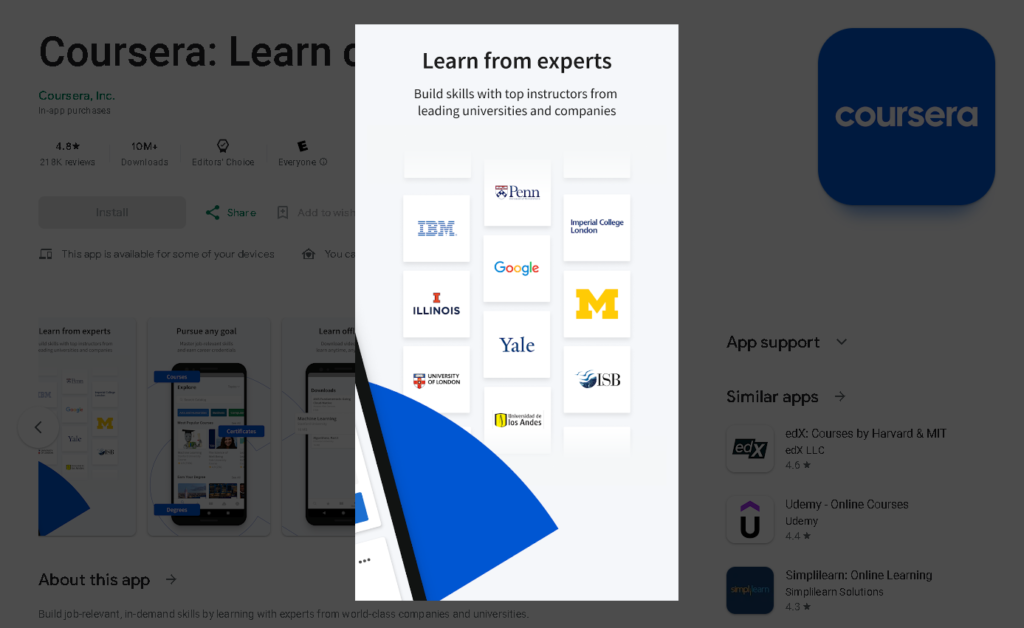
- Mobile Apps: Coursera also offers mobile apps for iOS and Android, making it easy to access courses on the go. These apps provide a smooth and intuitive interface.
- Offline Learning: Similar to Datacamp, Coursera’s mobile apps allow you to download course materials for offline access, enhancing mobile learning convenience.
- Responsive Website: Coursera’s website is optimized for mobile devices, offering a responsive design that adapts to various screen sizes.
Datacamp vs Coursera My Personal Experience and Methodology
As someone who has explored both Datacamp and Coursera extensively, I can offer insights based on my personal experience with these platforms and I can make a final decision on who wins the Datacamp vs Coursera battle.
My Experience with Datacamp
Datacamp stands out for its specialized focus on data science, analytics, and programming. The hands-on approach with interactive coding exercises was particularly valuable to me, as it allowed me to apply what I learned in real-world scenarios.
The skill tracks on Datacamp provide a structured path for skill development, and the mobile app made it easy to squeeze in learning during my daily activities.
My Experience with Coursera
On the other hand, Coursera impressed me with its extensive course catalog spanning a wide range of subjects. I appreciated the academic rigor and structure of Coursera courses, which often resembled traditional university courses.
The ability to audit many courses for free was a plus, and the option to earn certificates from prestigious universities enhanced my professional profile.
So, which platform is the Datacamp vs Coursera winner? Datacamp or Coursera?
Ultimately, the choice between Datacamp and Coursera depends on your specific learning goals.
If you seek specialization in data-related fields and prefer hands-on learning, Datacamp is an excellent choice.
However, if you have diverse interests, value academic credentials, or seek a broader range of subjects, Coursera may be more aligned with your aspirations.
My personal experience has shown that both platforms have their strengths, and the decision should reflect your unique learning journey.
Wrap Up
- Diverse Learning Paths: Datacamp excels in data science and programming, offering practical, hands-on skills.
- Specialization and Skill Tracks: It’s ideal for those seeking in-depth knowledge and career growth in data-related fields.
- Interactive Learning: Datacamp’s coding exercises and mobile accessibility enhance the learning experience.
- Broad Learning Spectrum: Coursera offers a vast array of subjects, including academic and professional courses.
- Academic Credentials: It’s suitable for those looking for university-recognized certificates and degrees.
- Flexible Learning: Coursera’s diverse courses and mobile apps cater to a wide range of learners.
Ultimately, your choice between Datacamp and Coursera depends on your specific goals. Datacamp empowers you with specialized skills, while Coursera opens the door to a world of diverse learning opportunities. Consider your aspirations, learning style, and career objectives to make an informed decision that aligns with your educational journey.
Frequently Asked Questions (FAQ)
Here are some common questions that learners often ask when comparing Datacamp vs Coursera:
1. Which platform is better for data science and programming skills: Datacamp or Coursera?
- Datacamp specializes in data science and programming, making it an excellent choice for those seeking in-depth expertise and practical skills in these fields.
- Coursera offers a broader range of subjects, but its data science and programming courses are also highly regarded.
2. Can I get certificates from both Datacamp and Coursera?
- Yes, both platforms offer certificates upon course completion. Datacamp provides certificates for individual courses and skill tracks, while Coursera offers certificates for individual courses, specializations, and degrees.
3. Are the certificates recognized by employers?
- Datacamp certificates are well-recognized in the data science and analytics industry, making them valuable for job applications in these fields.
- Coursera’s certificates often carry the name and logo of prestigious universities or institutions, enhancing their credibility and recognition.
4. Which platform is more suitable for academic learning?
- Coursera is better suited for academic learning, as it offers courses, specializations, and even full online degrees in partnership with universities and institutions.
5. Do both platforms have mobile apps for learning on the go?
- Yes, both Datacamp and Coursera offer mobile apps for iOS and Android devices, allowing learners to access courses and materials conveniently.
6. How do the refund policies differ between Datacamp and Coursera?
- Datacamp has a 30-day refund policy, allowing learners to request a refund within the first month of subscription.
- Coursera typically offers a 14-day refund policy for individual courses and Coursera Plus subscriptions. Refund terms may vary depending on the course provider.
7. Can I access course materials offline on both platforms?
- Yes, both Datacamp and Coursera offer the option to download course materials for offline learning, making it convenient for learners without consistent internet access.
These FAQs aim to address some of the key considerations when choosing between Datacamp vs Coursera. Your decision should align with your specific learning goals, preferences, and career aspirations.

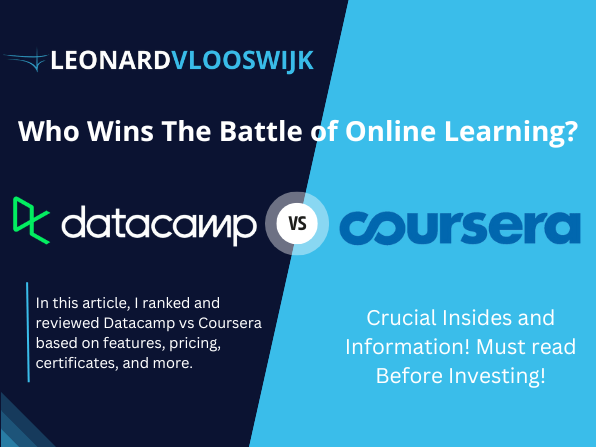
Pingback: Coursera vs edX: Which Platform Wins the Battle of Online Learning in 2023? - Leonard Vlooswijk